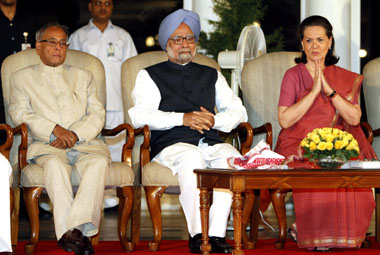By R Jagannathan
We know Pranab-da left a troubled legacy for Manmohan Sing to fix - including the retrospective Vodafone legislation, and the General Anti Avoidance Rules (GAAR), which have so riled investors.
But did he also leave several financial time-bombs that will have to be defused?
One of his last acts as finance minister was to okay a compensation of Rs 20,000 crore to states for losses on the central sales tax (CST) - a tax on inter-state movement of goods. This is a tax that states promised to eliminate provided the centre compensated for it. The centre hasn’t so far done this, and has used non-payment as a lever to ensure that states sign up to the new reform - the Goods and Services (GST) tax - first.
[caption id=“attachment_384747” align=“alignleft” width=“380”]  Manmohan Singh has no option but to raise diesel, kerosene and cooking gas prices. And he has no reason to thank Pranab Mukherjee. AFP[/caption]
But then, when Pranab-da decided to run for president, he needed all the support he could get from states. So what better way to sweeten his candidacy than by giving states some money?
However, the bill for his munificence now has landed up at the Prime Minister’s desk, according to The Economic Times, and the PMO is in two minds on whether to pay up what Mukherjee promised a day before demitting office or sit on it.
The newspaper says Mukherjee signed the compensation deal at the request of Sushil Modi, Finance Minister of Bihar. Bihar’s CM Nitish Kumar was, incidentally, one of Pranab Mukherjee’s prime backers for the presidency despite being part of the BJP-led National Democratic Alliance.
Now, with Mukherjee safely packed off to Rashtrapati Bhavan, the PM is trying to see how this payment can either be denied or delayed. But the states can’t be denied forever. Sushil Modi has already written to the PM asking for the cash.
Manmohan is clearly playing for time for he is Rs 19,700 crore short. Mukherjee signed off on Rs 20,000 crore of compensation but had made only a meagre Rs 300 crore provision in the budget.
The second time-bomb left by Mukherjee is the oil subsidy. Again, he wiped the budget provision clean before he went, leaving nothing for the PM to pay subsidies with.
The budget provided Rs 43,580 crore for oil subsidies, but as at the end of April, this money has been cleaned out. It was used to pay for last year’s dues (Rs 38,500 crore) and the remaining amount would have been barely enough to pay for April’s subsidies. (Read here )
This leaves Manmohan Singh with no option but to raise diesel prices steeply. In the April-June quarter, oil marketing companies (OMCs) reported under-recoveries (losses) of Rs 47,811 crore, and oil prices have begun rising again. Whole-year losses could top Rs 1,50,000 crore, and the PM has no money for it.
In the first half of July, the Indian basket of crude cost $97-98 a barrel. Now it costs $105 or thereabouts.
Manmohan Singh has no option but to raise diesel, kerosene and cooking gas prices. And he has no reason to thank Pranab Mukherjee, who has emptied out the treasury, leaving the PM with another time-bomb to deal with.
To push reforms through, the PM needs help from state allies. To buy their acquiescence, he needs to hand over cash. Giving out cash worsens his budget deficit. Not giving it means opposition from states to any measure that will reduce the budget deficit (like cutting oil subsidies). It also means no reforms on GST - something that the PM wants to push through to show he means business.
The third time-bomb, of course, comes to him, courtesy, Sonia Gandhi’s Food Security Bill. The plan, cleared in principle by the cabinet, involves covering 70 percent of the population at a subsidy cost of Rs 1,19,000 crore. Pranab-da has again provided only Rs 75,000 crore for food subsidies.
The only bit of luck is this: the bill won’t come due fully this year. By the time the Food Security Bill is legislated, half the year will be over. It will have to be fully paid for only next year. But then, the next budget will be the last one before elections. And who cares about budget deficits in an election year?


)
)
)
)
)
)
)
)
)



